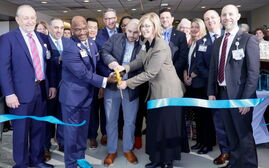
Processing Your Payment
Please do not leave this page until complete. This can take a few moments.
- News
-
Editions
View Digital Editions
Biweekly Issues
- May 13, 2024
- April 29, 2024
- April 15, 2024
- April 1, 2024
- March 18, 2024
- March 4, 2024
- February 19, 2024
- February 5, 2024
- January 22, 2024
- + More
Special Editions
- Lists
- Viewpoints
- HBJ Events
- Business Calendar
- Custom Content
Hartford HealthCare launches consulting business to help employers navigate COVID-19 risks
 Image | Contributed
Hartford HealthCare’s Dr. Mitchell McClure is shown on a webcast providing COVID-19-related safety advice to Stanley Black & Decker employees.
Image | Contributed
Hartford HealthCare’s Dr. Mitchell McClure is shown on a webcast providing COVID-19-related safety advice to Stanley Black & Decker employees.
As the COVID-19 pandemic stretches into its seventh month, with no imminent end in sight, many business leaders have a growing list of questions: What is the safest way to keep or return employees to the workplace? Should employers offer testing to their workers? What’s the best way to prevent sickness from spreading throughout an office, retail shop or factory?
As Connecticut embarks on its latest phase of reopening, questions and concerns abound.
After getting an influx of inquiries from area businesses, Hartford HealthCare has launched its “Hartford HealthCare at Work” program, intended to answer business leaders’ questions, address their concerns, and offer a customized plan of action to meet their needs during this unprecedented time.
“We saw a need with the onset of COVID,” said Dr. Mitchell McClure, clinical executive leader of Hartford HealthCare’s COVID-19 testing taskforce. “We got a lot of requests for assistance from a variety of local businesses. Hartford HealthCare at Work is really what we put together in response to that.”

Since its launch in May, more than 10 businesses have participated in the program, said McClure. The scope of services, and their pricing, depends on how in-depth companies want it to be. Offerings can be tailored to accommodate businesses of any size across all sectors.
Some companies opt mainly for consulting services, which are priced at an hourly rate; others use the program to provide on-site COVID testing to their employees, which brings additional fees, McClure said.
“[The cost] really varies depending on the level of engagement,” he said.
Many companies using the program so far are most interested in learning more about testing — whether they should test their workers for COVID and, if so, how they should do it. Other businesses are using the program to tap into Hartford HealthCare’s network of medical experts for guidance on return-to-work policies and procedures, as well as infection-control measures.
The program’s most extensive corporate relationship so far is with New Britain-based Stanley Black & Decker. The manufacturer had an existing relationship with Hartford HealthCare prior to the pandemic; McClure is Stanley’s chief medical officer, in addition to his role at Hartford HealthCare. He also is director of hospital medicine at Hartford Hospital and Hartford HealthCare Medical Group.
At Stanley Black & Decker, the Hartford HealthCare at Work program focuses on various aspects of the company’s approach to the pandemic. McClure reviews the company’s back-to-work and maintenance-of-work guidance, examines relevant corporate policies, and answers company leaders’ questions about when workers can remain at, or return to, work.
The program gives company officials, as well as employees, some peace of mind during a challenging time, said Abigail Dreher, Stanley Black & Decker’s director of public affairs.
“It just gives us that expertise and that level of comfortability, knowing that we’ve got an expert and a chief medical officer guiding that decision-making,” she said.
McClure also answers employees’ questions, helps establish safety protocols, and interacts with the company’s teams worldwide to ensure they’re following appropriate safety measures, she said.

“Our employees have not stopped working; they’ve been working throughout the whole pandemic,” she added, and being able to tap into the program’s resources helps make those within the company “as comfortable as comfortable can get in a situation like this.”
Since the pandemic began, Stanley, which has about 60,000 employees, has implemented various safety measures, including: daily temperature checks and screenings of employees and visitors, sending home any employees with symptomatic signs of illness, requiring employees and visitors to wear face masks at all times, mandating virtual work for all employees who can do it, and restricting non-essential travel, among others.
Business connections
Prior to this year, officials at Hartford HealthCare, which recorded $3.5 billion in operating revenue in fiscal 2019, had been considering ways to broaden the health solutions they offer to businesses, McClure said.
The pandemic has made that diversification play even more necessary as all hospitals — including the seven owned by Hartford HealthCare — face financial pressures from the impact of COVID-19, which canceled many elective surgeries during the spring and has many people hesitant to visit emergency rooms and other healthcare facilities.
That’s cost Connecticut hospitals hundreds of millions of dollars in lost revenue, according to the Connecticut Hospital Association.
“The COVID pandemic sort of moved things into hyper-drive and brought things into focus,” resulting in Hartford HealthCare at Work, McClure said.
The company offers similar services to colleges, universities and schools under a separate program called “Campus Care.” That program began prior to the pandemic, but has drawn increased interest in recent months, he said. To date, it has served more than 10 boarding schools, colleges and universities, including Trinity College and the University of Hartford.
Once the pandemic is over, McClure expects the Hartford HealthCare at Work program to continue. . Business leaders will always need advice on how to best care for workers’ health, and Hartford HealthCare will keep exploring and seeking new ways to partner with Connecticut employers, he said.
“I think we’re going to be dealing with [COVID] for quite some time. We’re going to be permanently changed,” he said. “The way we think about risk is going to be forever changed, probably for at least the next generation to come.”
For more information on the program, email AtWork@hhchealth.org.
Related Content

2022 Giving Guide
This special edition informs and connects businesses with nonprofit organizations that are aligned with what they care about. Each nonprofit profile provides a crisp snapshot of the organization’s mission, goals, area of service, giving and volunteer opportunities and board leadership.
Learn more
Subscribe
Hartford Business Journal provides the top coverage of news, trends, data, politics and personalities of the area’s business community. Get the news and information you need from the award-winning writers at HBJ. Don’t miss out - subscribe today.
Subscribe
2024 Book of Lists
Delivering Vital Marketplace Content and Context to Senior Decision Makers Throughout Greater Hartford and the State ... All Year Long!
Read Here-
2022 Giving Guide
This special edition informs and connects businesses with nonprofit organizations that are aligned with what they care about. Each nonprofit profile provides a crisp snapshot of the organization’s mission, goals, area of service, giving and volunteer opportunities and board leadership.
-
Subscribe
Hartford Business Journal provides the top coverage of news, trends, data, politics and personalities of the area’s business community. Get the news and information you need from the award-winning writers at HBJ. Don’t miss out - subscribe today.
-
2024 Book of Lists
Delivering Vital Marketplace Content and Context to Senior Decision Makers Throughout Greater Hartford and the State ... All Year Long!
ABOUT
ADVERTISE
NEW ENGLAND BUSINESS MEDIA SITES
No articles left
Get access now
In order to use this feature, we need some information from you. You can also login or register for a free account.
By clicking submit you are agreeing to our cookie usage and Privacy Policy
Already have an account? Login
Already have an account? Login
Want to create an account? Register
Get access now
In order to use this feature, we need some information from you. You can also login or register for a free account.
By clicking submit you are agreeing to our cookie usage and Privacy Policy
Already have an account? Login
Already have an account? Login
Want to create an account? Register









0 Comments